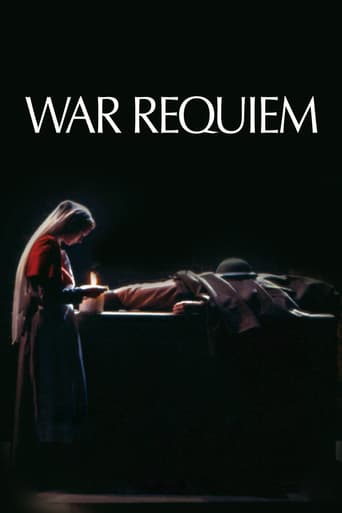Guillelmina
The film's masterful storytelling did its job. The message was clear. No need to overdo.
Bob
This is one of the best movies I’ve seen in a very long time. You have to go and see this on the big screen.
Staci Frederick
Blistering performances.
Brooklynn
There's a more than satisfactory amount of boom-boom in the movie's trim running time.
bkoganbing
I was watching War Requiem which is Derek Jarman's conception of images of the music of Benjamin Britten and the poetry of Wilfrid Owen and I thought this was a work better left to the imagination. Beautiful, but something I might imagine hearing it would be a lot different.Newsreel footage of World War I and more contemporary conflicts are mixed in with live pantomime like performances of various players and singers including Laurence Olivier in his farewell performance. Olivier plays a wheelchair bound veteran of World War I in whose eyes all the images are seen. Benjamin Britten's War Requiem was originally composed for the dedication of the new cathedral in Coventry, the old one as well as the town itself pretty much blasted to smithereens by Hitler's Luftwaffe. The words are by Wilfrid Owen, the various verses he wrote are put to Britten's music. Owen was killed almost exactly a week before the Armistice was signed in 1918. Oddly enough both men were as one British friend of mine puts it, 'as gay as green shoes'.This is Jarman's vision, not necessarily mine, not necessarily your's. I think that art like this is best left to the individual imagination. But Jarman does a vision of terrible beauty as W.B. Yeats put it.
Framescourer
With the exception of an opening sequence in which the music is introduced over a tolling bell and the text of Wilfred Owen's Strange Meeting read, this film follows the scheme of Britten's War Requiem, a poetry-expanded musical setting of the Requiem Mass. It's an intermittently effective project, Jarman using both narrative scenes and more abstracted tableaux that rely on the actor in frame to channel some sort of internal narrative. There is also scattered use of period footage from conflicts both pre-1963 (the date of the oratorio's composition) and as recently as the Falklands conflict (1981). All this is, in turn, the extrapolated daydream of a veteran of the Great War, played by Lawrence Olivier. Olivier's is the almost the only scene done on location and really does carry weight for all that it's mere seconds of screen time. Other scenes are rather more mixed: given the huge emotional and indeed satirical charge of the music the most affecting set pieces are those that play a straight narrative. That said, there is undeniable charge in the formal composition of static shots which reflect in their old master/biblical referencing the liturgy of the text. 5/10
dcovec
Jarman to a T: Brilliant, atmospheric, imagistic, eccentric, and sometimes homo-erotic. An incredible blend of one of the great 20th century musical works on (or rather against) war and the cinematographic art. I've seen this film twice now. Some of the comments given by other reviewers seem to miss the point of the film- it is dark and sometimes jarring. Jarman uses historic footage, color and colorization as a technique to refocus the viewer's eyes and thoughts. Jarman is not interested in narrative so much as building a series of images that take the poem and music to a new place of understanding.Perhaps this film is not for everyone- but then I would love to tie every politician to his or her chair and force its viewing.
resin
A misguided attempt at a music video for Benjamin Britten's piece of the same name, "War Requiem" falls flat because of this very concept. To their credit, the filmmakers add or subtract nothing to the performance of the Requiem but rather present a montage of images to be seen along with the performance (which thankfully is top-notch). Unfortunately, the end result is a long almost MTV quality production which makes one realize how unbearably pretentious the phenomenon of the music video can be.War Requiem is a work which invites personal involvement, so I can appreciate the obvious love and need to contribute which the filmmakers have for it, but Britten's music and Wilfred Owen's poetry speak so eloquently for themselves that this pretentious performance art approach merely detracts from them.

